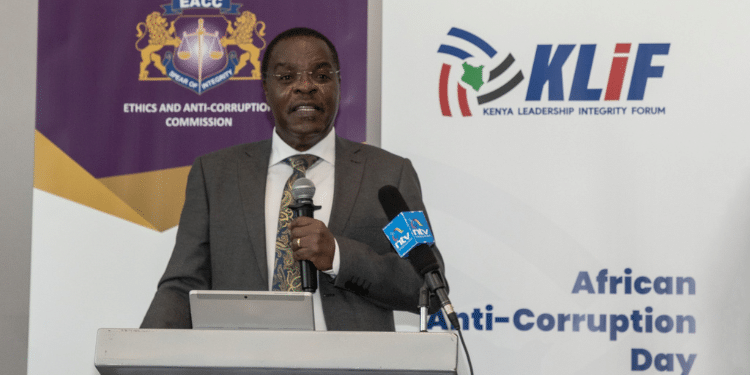The Ministry of Interior and National Administration, along with the Ministry of Health, headed by CSs Kipchumba Murkomen and Aden Duale, respectively, have been identified as the most corrupt government ministries according to the National Ethics and Corruption Survey 2024 published by EACC.
This report, launched on Tuesday, August 5, 2025, at the Ethics and Anti-Corruption Commission (EACC) Headquarters at Integrity Centre, highlights areas perceived to be most vulnerable to unethical conduct and corruption.
The survey aimed to evaluate which national government ministries, departments, agencies, as well as county government departments and services, are most commonly associated with unethical practices and corruption in the country.
EACC Says Ministries of Interior and Health Lead in Corruption
Findings revealed that the likelihood of encountering corruption is highest in the following ministries:
- Ministry of Interior and National Administration (47.8%)
- Ministry of Health (19.7%)
Also Read: EACC Recovers Grabbed Land Parcels Worth Sh320M in 2 Counties
Other ministries associated with unethical practices and their respective percentages include:
- National Treasury (Pensions Department) – 5.8%
- Ministry of Lands, Public Works, Housing and Urban Development – 4.7%
- Ministry of Education – 4.1%
Additionally, the EACC report identified government departments and agencies perceived as most prone to unethical practices and corruption. The findings include:
- Kenya Police (48.2%)
- Directorate of Immigration (5.1%)
- National Registration Bureau (4.4%)
- Traffic Police (3.6%)
- National Treasury (3.5%)
- Civil Registration (3.4%)
- State Department for Internal Security and National Administration (3.2%)
- Social Health Authority (2.7%)
In terms of county governments, the departments most prone to unethical practices and corruption were:
- County Health Services (45.1%)
- County Transport (9.1%)
- County Agriculture (7.9%)
- County Administrative Department/Unit (4.8%)
- County Public Service Board (4.7%)
The survey also assessed the involvement of different professionals in unethical practices and corruption, along with the level of public service satisfaction in Kenya.
The results showed that police officers are considered the most corrupt officials (27.6%), followed by KRA officers (17.3%), chiefs (16.2%), county inspectorate officers (14.6%), lawyers (14.1%), county revenue officers (13.4%), and land surveyors (13.3%).
At the same time, the EACC stated that the professionals reported to be least involved in unethical practices and corruption included teachers (24.5%), journalists (22.8%), university lecturers (19.4%), bankers (16.6%), doctors and nurses (13.9%), and economists (13.5%).
About the National Ethics and Corruption Survey (NECS) Report
The National Ethics and Corruption Survey (NECS) is an annual report published by Kenya’s (EACC). The report provides a detailed, data-driven assessment of the state of corruption and unethical conduct across public institutions, including national and county governments, ministries, departments, and agencies.
Also Read: Murkomen Announces Major Shake-up at Ministry of Interior
The primary goals of the survey are to:
- Measure public perceptions of corruption and unethical behaviour.
- Identify institutions most prone to corruption.
- Highlight common corruption practices, including types of bribes and services linked to them.
- Evaluate the effectiveness of anti-corruption measures in place.
- Guide policy and reforms to improve integrity and service delivery in public institutions
Follow our WhatsApp Channel and X Account for real-time news updates.




















































![Senator Allan Chesang And Chanelle Kittony Wed In A Colourful Ceremony [Photos] Trans Nzoia Senator Allan Chesang With Channelle Kittony/Oscar Sudi]( https://thekenyatimescdn-ese7d3e7ghdnbfa9.z01.azurefd.net/prodimages/uploads/2025/11/Trans-Nzoia-Senator-Allan-Chesang-with-Channelle-KittonyOscar-Sudi-360x180.png)























